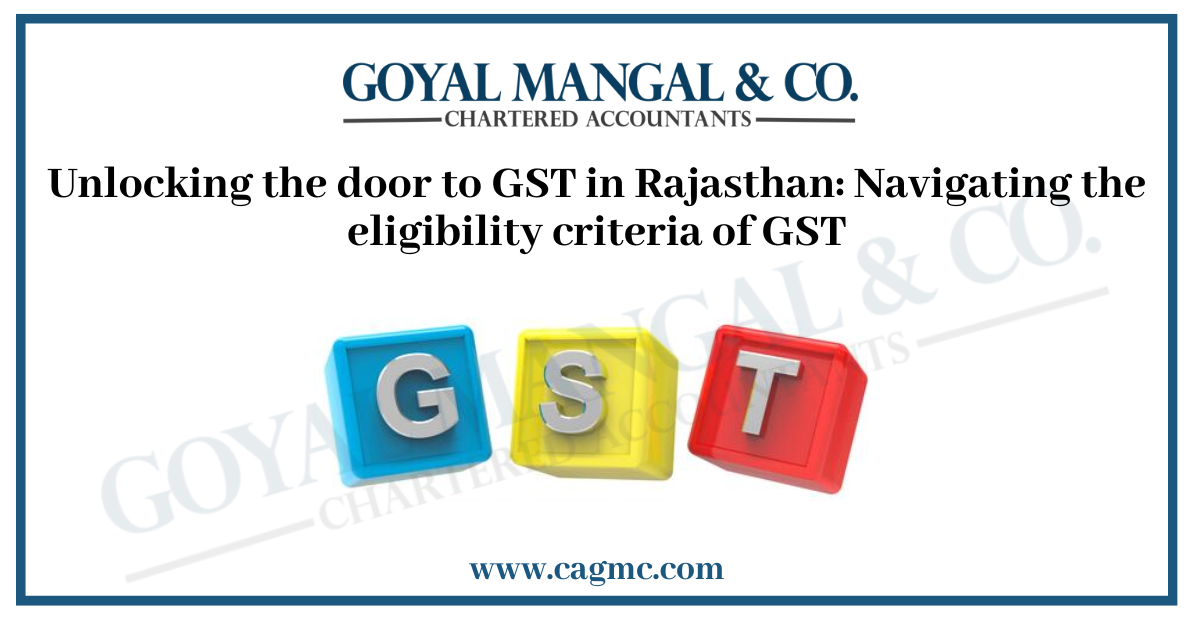
I heard the desert state of Rajasthan is a tapestry of vibrant colours and rich heritage. However, beneath its majestic forts and bustling bazaars lies a modern realm of taxation i.e., Goods and Services Tax (GST) regimes supreme. In case you have a business in this land of royalty, then understand the eligibility criteria for GST Registration. It is like finding the key to a treasure trove of opportunities. Let’s share valuable information about the Eligibility Criteria For GST Registration in Rajasthan, which determines your pathway towards GST compliance.
|
Table of Content |
Short note on GST Registration
GST registration means a procedure by which an individual or business becomes a registered taxpayer according to the GST system. GST is a comprehensive indirect tax levied on the supply of goods and services all over India. It replaced several indirect taxes like VAT, service tax, central excise duty, and others.
GST registration is essential for businesses to comply with the GST rules and regulations. By attaining GST registration, a business gains legal recognition and authorization to collect GST from its consumers. That we called output tax, and avail input tax credit on GST paid on their purchases.
Once registered, a taxpayer is assigned a unique GST identification number (GSTIN) by the tax authorities. This GSTIN serves as a unique identifier for the taxpayer throughout their GST journey.
Importance of GST Registration in Rajasthan
GST registration holds importance for businesses operating in Rajasthan. Here are some key reasons why GST registration is important in the state:
- Input Tax Credit (ITC): GST registration allows businesses to avail of the input tax credit, which is a mechanism to offset the GST paid on purchases against the GST liability on sales. Registered businesses can claim ITC on their purchases of goods and services, reducing their overall tax liability. This helps in minimizing the cascading effect of taxes and promotes cost efficiency.
- Inter-State Trade: Rajasthan, being a state with a significant geographical location, witnesses inter-state trade. GST registration is necessary for businesses engaged in the supply of goods or services to other states. Without GST registration, inter-state transactions would be restricted, hindering business expansion and growth opportunities.
- Compliance with E-commerce Platforms: With the rapid growth of e-commerce, GST registration is crucial for businesses that engage in online selling. Most e-commerce platforms require sellers to have a valid GST registration before they can sell their products or services on their platforms. This enables businesses to tap into the vast e-commerce market and reach a wider customer base.
- Compliance with Anti-Tax Evasion Measures: GST registration contributes to the government’s efforts to curb tax evasion and promote transparency. By registering under GST, businesses become part of the formal economy, reducing the scope for black market transactions and promoting a fair tax system.
- Legal Compliance: GST registration is a legal requirement for businesses whose turnover exceeds the prescribed threshold limits or falls under the mandatory registration criteria. By obtaining GST registration, businesses ensure compliance with the tax laws of Rajasthan and the entire country.
- Business Credibility and Access to Government Contracts: GST registration enhances the credibility of a business. Many government agencies and large corporations require their suppliers to be GST registered. By having a GST registration, businesses become eligible to participate in government tenders, contracts, and procurement processes.
Eligibility Criteria for GST Registration in Rajasthan
The eligibility criteria for GST registration in Rajasthan are as follows:
- Threshold Turnover: If your annual aggregate turnover in the previous financial year exceeded the threshold limit, you are required to register for GST. The threshold limits for GST registration are as follows:
- For businesses engaged in the supply of goods:
- In the case of businesses located in Special Category States, including Rajasthan, the threshold limit is Rs. 40 lakhs.
- In the case of businesses located in the rest of India, the threshold limit is Rs. 20 lakhs.
- For businesses engaged in the supply of services: The threshold limit for service providers, regardless of their location, is Rs. 20 lakhs.
- Mandatory Registration: Regardless of turnover, certain businesses are mandatorily required to register for GST, including:
- Businesses making inter-state taxable supplies.
- Casual taxable persons or non-resident taxable persons.
- E-commerce operators or aggregators.
- Input service distributors.
- Those who are liable to pay tax under the reverse charge mechanism.
- Businesses that were registered under the previous indirect tax regime (e.g., VAT, Service Tax, etc.).
- Voluntary Registration: Even if your turnover does not exceed the threshold limits, you have the option to voluntarily register for GST. This can be beneficial if you want to avail of input tax credit or if you conduct business with other registered entities.
Necessary documents required for GST Registration in Rajasthan
To register for GST in Rajasthan, you would typically need the following documents:
- Permanent Account Number (PAN) of the business: PAN is a mandatory requirement for GST registration. You will need to provide a copy of the PAN card for the business entity.
- Proof of business registration: Depending on the type of business entity, you will need to provide the following documents:
- For proprietorship: Any document that proves the existence of the proprietorship, such as a registration certificate, partnership deed, or trade license.
- For partnership: Partnership deed or certificate of registration of the partnership.
- For company: Certificate of incorporation issued by the Registrar of Companies (ROC).
- For Limited Liability Partnership (LLP): Certificate of incorporation issued by the Ministry of Corporate Affairs (MCA) and partnership deed.
- For society, trust, or non-profit organization: Registration certificate or any other proof of registration.
- Identity and address proofs: You will need to submit the following documents for the promoters, partners, directors, or authorized signatories of the business:
- Aadhaar card
- Passport
- Voter ID card
- Driving license
Additionally, you will need to provide proof of the business address, such as an electricity bill, rent agreement, or ownership documents.
- Bank account details: You will need to provide a cancelled cheque or bank statement that shows the name of the account holder, account number, branch address, and IFSC code.
- Digital signature certificate (DSC): For Private Limited Companies, LLPs, and certain other types of businesses, a digital signature is required for GST registration. It is used to sign the application electronically.
- Photographs: Recent passport-sized photographs of the promoters, partners, directors, or authorized signatories.
Takeaway
Understanding the eligibility criteria for GST registration in Rajasthan is vital for businesses functioning in the state. Whether you exceed the turnover threshold or fall under the compulsory registration category, complying with GST regulations is essential. Furthermore, GST registration ensures compliance with anti-tax evasion measures, a fair tax system, and promotes transparency.


